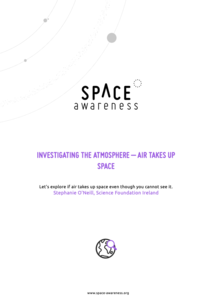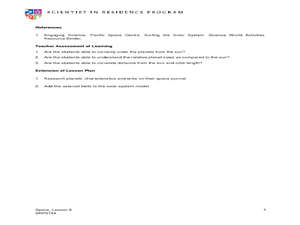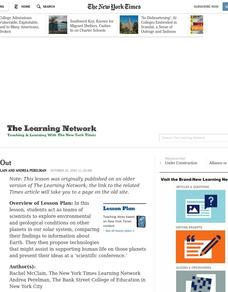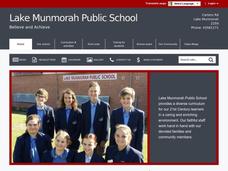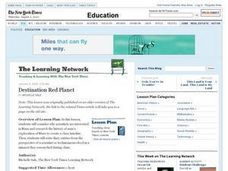American Museum of Natural History
Space Jell-O
A tasty treat lends its curious substance to space exploration. Mimicking the discoveries of Albert Einstein, young astronomers beginning by making a batch of Jello-O, then four hours later, scholars place edible objects that act like...
PBS
The Planets of the Solar System
Launch a lesson that's sure to capture middle schoolers' interest! Exploration enthusiasts examine the planets of our solar system using an activity from PBS's Space series. The resource includes images and information for each planet,...
American Museum of Natural History
Beyond Planet Earth
Scholars take a journey through space with 16 eye-catching images. Along the way, learners read captions starting with the moon, then move onto asteroids, Mars, and Jupiter.
Space Awareness
Investigating the Atmosphere - Air Takes Up Space
How do you know there is air? Can you see it, smell it, feel it? To begin the investigation, learners watch a video and discuss what they know about air and the atmosphere. Then, they participate in five different hands-on, inquiry-based...
Teach Engineering
Get Me Off This Planet
What do Newton's Laws have to do with getting from Earth to Mars?The activities in this resource show how Newton's Laws work with rockets to get them into space. Background information includes facts about orbits and how orbits...
Curated OER
Spacecraft Launched on Mission to Pluto
Pupils read a news article about a space mission being launched to the planet Pluto. They study the necessary vocabulary and complete an anticipation guide of questions which they revisit after they read the article.
Curated OER
How To Build a Planet From The Inside Out!
High schoolers read about the Spitzer Space Telescope and the technology used to learn about planet composition. They calculate the radius of a planet, the size of a planet, the average density of a planet and the likely core composition...
Space Awareness
Know Your Planets
Does your class know their planets? Implement an activity that has them describing the solar system, identifying properties of the planets, and placing them in order from their distance from the sun.
Coloring Castle
Planets
From Mercury to Uranus, this printable coloring page includes images of all eight planets found in our solar system, making it a fun way to engage young scientists in learning about outer space.
University of Colorado
Modeling Sizes of Planets
The density of the huge planet of Saturn is 0.7 g/cm3, which means it could float in water! In the second part of 22, science pupils explore the size and order of the planets. They then calculate weight and/or gravity and density of...
Messenger Education
Give Me a Boost—How Gravity Assists Aid Space Exploration
The propellant needed for space explorations runs in the thousands, while paying to get the craft into orbit costs millions! In the second installment of three, two activities explore laws of conservation of energy and momentum. Using...
A to Z Teacher Stuff
Solar System Book
Young astronomers travel through the solar system in the pages of this printable book. With clear pictures and simple sentence structure, this is a perfect resource for exploring the planets in the early elementary grade levels.
CommonCoreSheets.com
The Space Race
From the USSR's launch of Sputnik in 1957 to Neil Armstrong's mission to the moon in 1969, review major events in the timeline of the space race during the mid-twentieth century.
Laboratory for Atmospheric and Space Physics
The Planets and Scale
Scholars gain an insight into the relative size of planets and distance between inner and outer planets with the help of informational text, a data table, and a series of four questions.
Glynn County School System
Solar System Formation and Extra-Solar Planets
Has the solar system always been like it is today? A lesson presentation begins with a discussion of the formation of our solar system. It continues with a compare and contrast of the inner and outer planets.
PHET
Planet Designer: Kelvin Climb
It's time to get those creative juices flowing! This second instructional activity in a series of five continues allowing pupils to design their own planets. It the same format as the first, but, this time, allows students to alter...
Laboratory for Atmospheric and Space Physics
Goldilocks and the Three Planets
Venus is the second brightest object in the night sky after the moon. Here is an interesting lesson that explores three planets — Venus, Earth, and Mars — specifically their surfaces and atmospheres. Through an analysis of their spectra,...
Curated OER
Planets Worksheet
In this planets worksheet, students use Internet research to complete 5 pages about solar system facts. Students answer 25 essay questions and label a diagram of the solar system.
Curated OER
Space: Our Star, the Sun, and Its Friends, the Planets
Students examine the solar system. For this space lesson, students identify the order of the planets and their relative size to the sun. Students create a scale model of our solar system using a variety of household objects.
Curated OER
Spacing Out
Young scholars explore environmental and geological conditions on other planets in our solar system, comparing their findings to information about Earth. They propose technologies that might assist in supporting human life on those planets.
Curated OER
Space
In this space worksheet, learners respond to 12 various questions related to the solar system, space exploration, and space facts. First, they list the number of moons each planet has. Then, students name the first space flight and who...
Curated OER
Destination Red Planet
Young scholars explore reasons why people are interested in exploring other planets. After reading an article, they identify developments in the mission to Mars. Using the internet, they research the history of exploring Mars and...
Curated OER
Space Words and Comparatives
Which is bigger: the sun or the moon? Which is nearer: the planets or a star? English Language Learners first located a series of space-related nouns and adjectives in a word search, and then identify the comparative and superlative...
NASA
Space Images
As technology advances, so does our understanding of the universe around us. Thanks to the Hubble Telescope, Mars rovers, and other high-resolution cameras, there are amazing photographs of celestial bodies, planets, comets, and more...
Other popular searches
- Planets Outer Space
- Science Space and Planets
- Outer Space Outer Planets
- Poetry Space and Planets
- Planets and Space
- Space Planets Scale
- Space and Planets Practical



